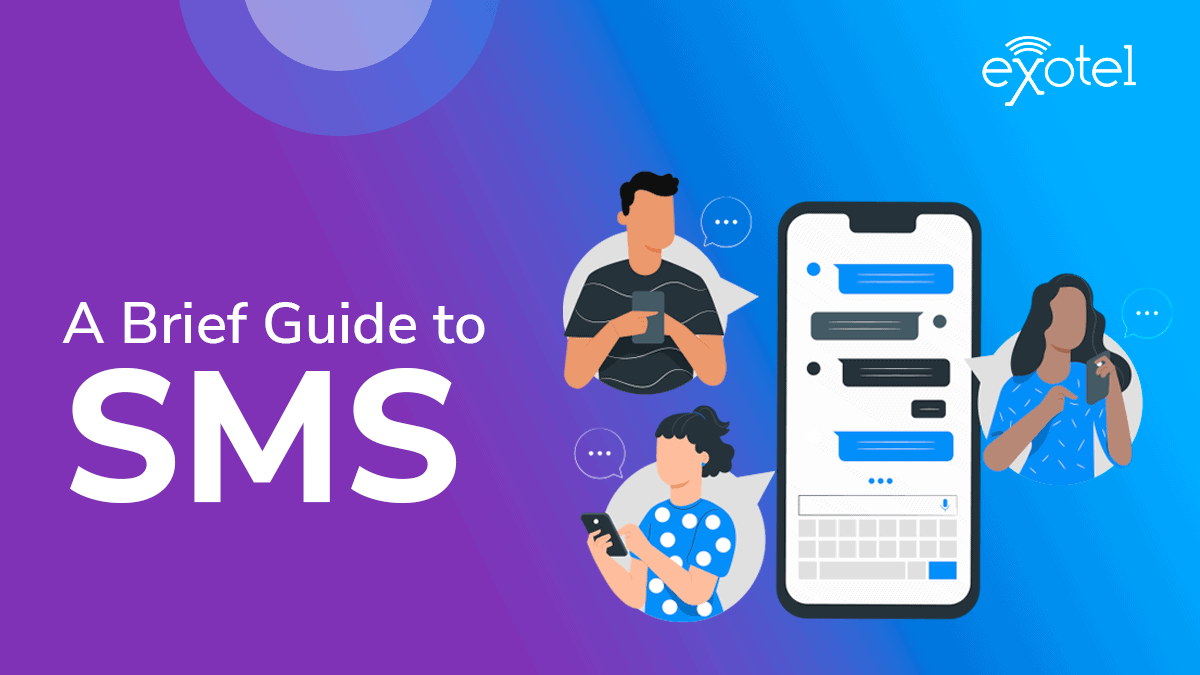Started as a personal communication channel a few decades ago, SMS has recently transformed into a potent marketing medium. Such is the popularity of SMS.
Today, around 58% of consumers expect businesses to text them instead of using other channels like emails and phone calls. This blog post explores what an SMS is and how you can use it for your business needs.
What is SMS?
Short Message Service, commonly known as SMS, is a text-based communication channel. You can send 160 characters or fewer text messages to anyone with a mobile phone. The best part about SMS is that the receiver’s phone need not be ‘smart’ to receive an SMS.
In India, where only 24% of the population owns a smartphone, SMSes are a simple, efficient, and cost-effective way to reach a broad audience.
How has the usage of SMS evolved over the years?
The ease of use, instant deliverability, and widespread mobile phone adoption catapulted the SMS. In 2005, around 81 billion text messages were shared between people in the US. (Source: Statistica) This number shot up to 2.05 trillion in 2010 and hit 2.2 trillion in 2020.
As users grew, businesses saw this as an effective medium for communicating with their customers, promoting their products/services, etc. Given SMSes are more personal and instant, they were opened and read more by the audience. SMSes have a whopping 98% open rate! (Source: Gartner) Naturally, this encouraged businesses to adopt it more widely.
Today, the usage of SMSes by businesses has grown beyond marketing messages. It is also being used for sharing transactional information and high-priority updates. So let’s delve deeper into the different types of SMSes that businesses send today.
What are the different types of SMS used by businesses?
#1 Transactional SMS
Transactional SMSes are mainly alerts or updates a business sends to the customer. These messages don’t contain any promotional or marketing content. Some common transactional SMSes include order confirmations, shipment updates, appointment reminders, etc.
#2 Promotional SMS
Businesses use promotional SMSes to inform customers and prospects about new deals, offers, and discounts. These are sent regularly to engage with the customer and bring them back to the brand.
#3 High Priority SMS
These are time-specific messages that complete important transactions with the customers. It can include OTP messages, payment, and billing-related information, KYC verification, or other important acknowledgments. Businesses mainly send high-priority SMSes because they are an instantaneous channel and can reach a customer without the internet.
There is one more type of SMS used by businesses. It’s called transactional opt-in. Though not purely transactional, these messages are sent only to registered customers. Common types include thank you messages, event invitations, etc.
Why do businesses need SMS?
#1 High deliverability and open rates
SMSes receive much better open and response rates than other channels such as email, phone calls, etc. (Source: Gartner) This means the chances of your message reaching a customer, be it promotional or transactional, are extremely high. With platforms like Exotel, you can further improve deliverability with intelligent SMS routing.
#2 Measurability
Like emails, SMSes can be tracked. This feature is particularly useful if you are using SMS for promotional purposes. Exotel lets you track open rates, delivery rates, latency rates, delivery failures, and reasons. By monitoring these metrics, you can improve your SMS campaign’s success and strengthen your user database for better segmentation and targeting.
#3 Cost-effectiveness
The SMS itself costs very little to send. Bulk SMS sending has limited barriers, thus eliminating the need for additional tools to improve deliverability. Platforms like Exotel take care of everything from scheduling SMS to tracking their performances. Again, no additional tools!
Everything to consider before adopting SMS for your business
Sending bulk SMSes is simple to get started. Platforms like Exotel allow you to do it online at the click of a button. However, before you begin, it is good to think about the following.
Communication strategy
If you’re adopting SMS as a new channel, you need a coherent strategy to power it. Begin with the following:
- Segment the audience
- Complement your current communication via email/phone etc. with SMS
- Choose the nature of SMSes you might send — marketing, promotional, onboarding, etc
- Fix the frequency of sending these messages; it is best to start slow
Writing the SMS
When sending thousands of messages daily, it is crucial to get each one right. Consider the following while writing the SMS:
- Include a call-to-action
- Choose the right time to send messages for maximum engagement
- Send targeted messages to user segments
- Personalize whenever you can
Measurement and optimization
Like any marketing initiative, you need to measure the ROI of your SMS campaigns and optimize them. Consider the following:
- Open rate
- Clickthrough rates
- App downloads
- Conversions from customers originating from SMS
For more on getting started with SMS, click here: An 11-Point Checklist You Need Before You Send an SMS
The humble SMS has become a potent tool at the hands of a business, be it a small and medium enterprise (SME) or a multinational corporation. At Exotel, we help companies leverage SMSes to achieve their business goals. We take care of your SMS engine’s technology foundation with a robust SMS API, state-of-the-art security features, in-built automation capabilities, and advanced analytics dashboards.




 +91-8088919888
+91-8088919888 +61-2-8073-0559
+61-2-8073-0559 +62-215-098-4960
+62-215-098-4960 +60-3-2771-2799
+60-3-2771-2799 +65-6951-5460
+65-6951-5460